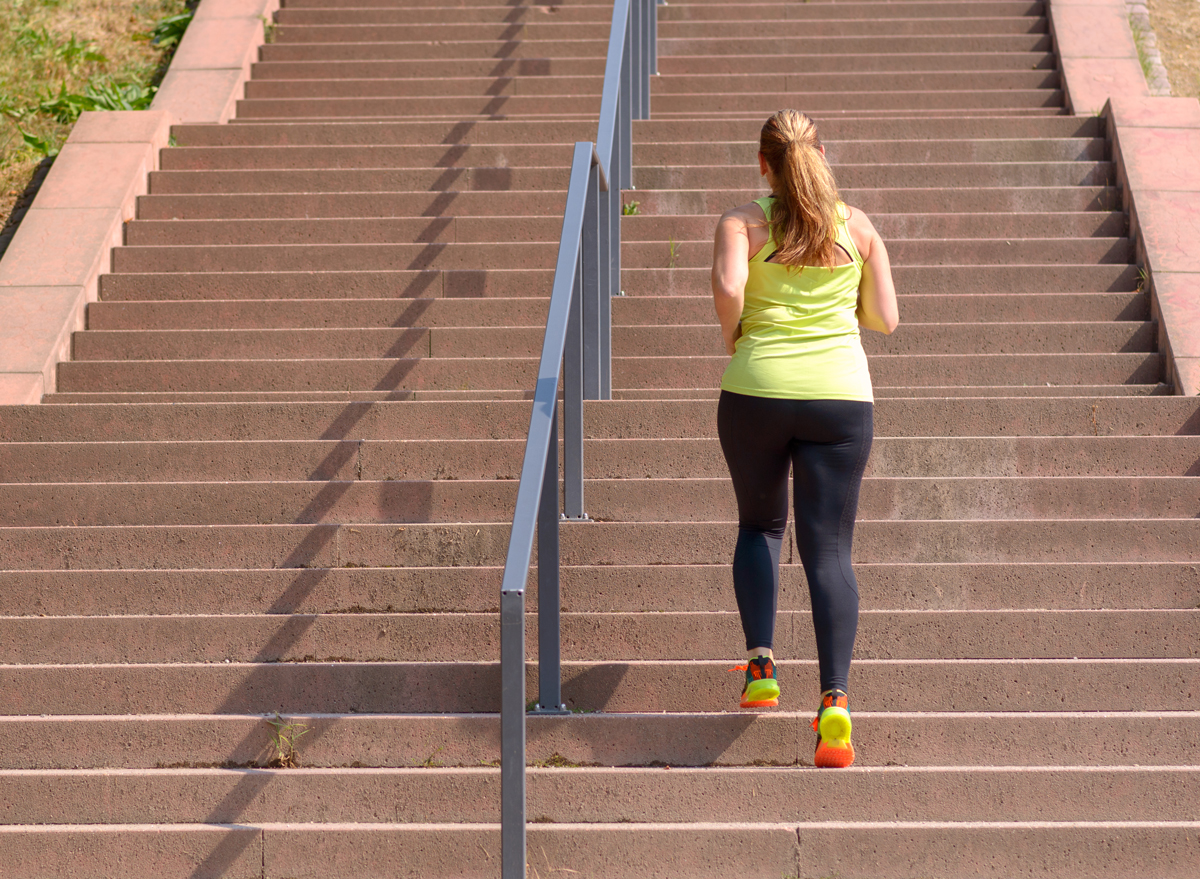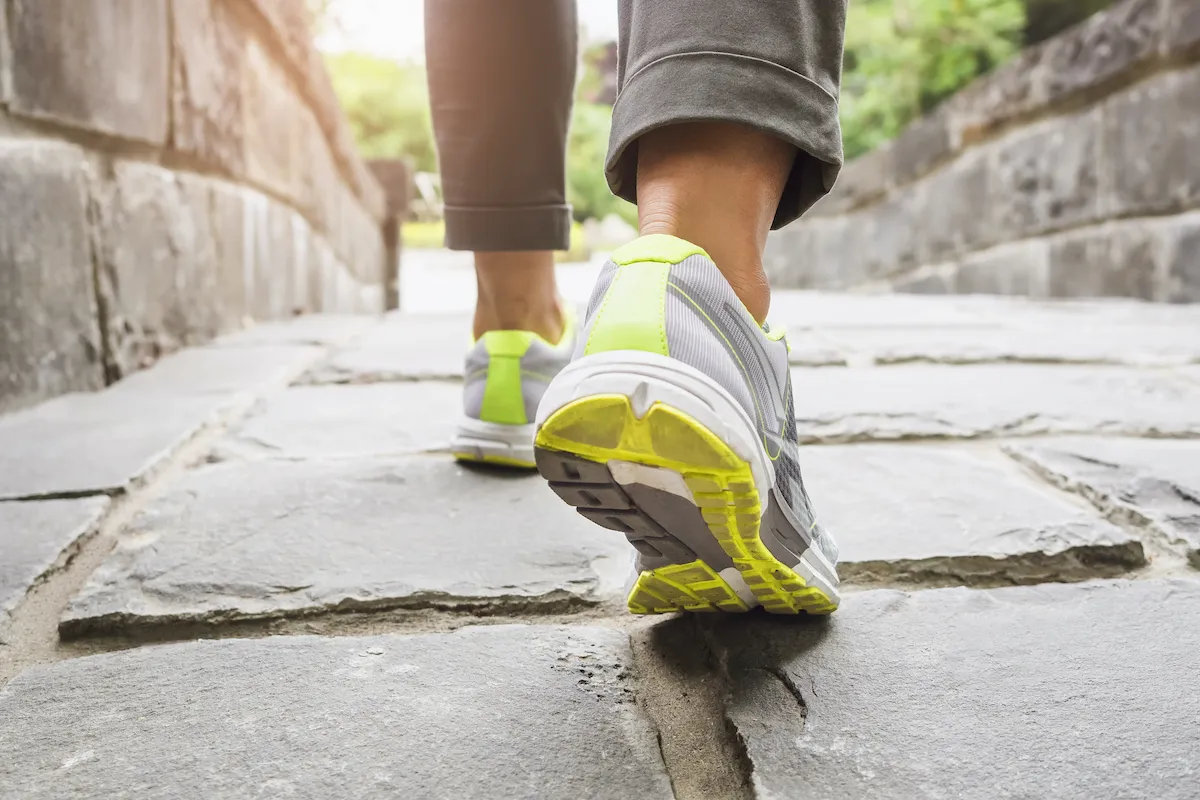Incredible Things That Happen When You Walk More, Say Experts

If you walk more every day, you probably know that you’ll be burning more calories, you’ll be bolstering your heart health, and you’ll be adding years to your life. You probably also know that you’ll enhance your basic physical fitness and your mobility, as well. But did you know that you’ll give yourself a nice confidence boost? Or that you’ll be sending oxygen—and creative juices—racing to your brain? Or that you’ll be priming yourself to make better decisions throughout your day? It’s all true, according to the top health experts we spoke to. For some of the interesting—and even incredible—things that happen when you walk more every day, read on, because we lay out of a handful of them right here. And if you love walking, don’t miss The Secret Cult Walking Shoe That Walkers Everywhere Are Totally Obsessed With.
Walking Builds a Greater Sense of Self-Efficacy

According to the American Psychological Association, “self-efficacy” is defined as one’s “belief in his or her capacity to execute behaviors necessary to produce specific performance attainments; [it] reflects confidence in the ability to exert control over one’s own motivation, behavior, and social environment.”
In short: It’s confidence in yourself and your abilities. According to Jaclyn London, MS, RD, CDN, Head of Nutrition & Wellness at WW, walking more every day—and making it a central component of your routine—is a surefire way to get more of this coveted self-assuredness. “Walking can be a tool in building self-efficacy,” she says. “In general, starting a new routine around an activity can help you build confidence in your own skills and abilities—and walking is no exception.”
What’s more, research has shown that if you walk with a more confident posture, you’ll actually improve your own confidence. So walk tall, walk more, and feel your confidence flow! And for more great walking tips, check out these Secret Little Tricks for Walking More Every Day, According to Experts.
Walking Allows You to Let Go of Toxic Thoughts

You know that walking helps improve your circulation. But you may not know that, in the process, you’ll be sending tons of oxygen to your brain. “Walking sends increased blood flow to the brain, which is linked to better cognitive function, protection against decline and improved memory,” says Holly Schiff, Psy.D., licensed clinical psychologist based in New York and Connecticut. “Walking encourages our brain to release endorphins, a neurotransmitter that boosts our mental health (feel-good chemicals).”
Walking also can increase the size of your hippocampus, the region of your brain that plays a critical role in forming and storing memories, she says. “Walking reduces stress, anxiety, and fatigue, and reduces your risk of becoming depressed—so it is also beneficial for your mental health. Interestingly enough, it can also help you ruminate less on negative or toxic thoughts.”
Walking Enhances Your Zs

“Walking helps improve sleep quality,” says WW’s London. “Regular to moderate physical activity—such as walking—can increase both the length and quality of your sleep.”
She highlights a 2019 study published in the journal Sleep Health, which notes that people who walked more during their waking hours reported having a better night’s rest.
For maximizing your walks for better sleep, you should make it a routine to walk at first light. As doctors have previously explained to us, walking in the morning before breakfast can help you reset your biological clock every day, ensuring that you’ll be primed for a better night’s rest that evening. And for more great walking tips, make sure you know The Secret to Walking Your Way to a Lean Body, Say Experts.
Walking Makes You a Better Decision Maker

According to a study published in the British Journal of Sports Medicine, the daily act of performing 30 minutes of moderate-intensity exercise—such as brisk walking—not only improves your cognitive performance, but it also improves the cognitive functions associated with smarter and better decisions. Win win!
Walking Activates Your Creativity

Ever noticed how your best ideas come to you while you’re walking? It’s not a coincidence. “When walking alone, the mind and brain can synch and help create some great ideas while thinking outside,” says Marvin Nixon, MS, NBC-HWC. “Walking while paying attention to our surroundings and paying attention to how our body walks is a mindfulness practice that can be just as useful for our mind as an eyes-closed meditation.”
There’s no shortage of research linking walking with a flourishing, fertile brain. One study, published by APA PsycNet, found that exercising more is associated with the creation successful innovations. More recently, a study conducted by researchers at Austria’s University of Graz and published in the journal Scientific Reports found that walking is directly linked to enhanced creativity. And for some great ways to take your walking to a higher level, make sure you’re aware of the The Secret Trick for Walking for Exercise, According to Health Experts at Harvard University.
Walking Helps Your Body Get Stronger

We can’t say loudly enough here at ETNT Mind+Body: Walking is exercise. “Walking can help you get stronger,” says London. “While walking on flat ground may not build muscle, choosing a walking route that has stairs or hills will increase resistance and help strengthen muscles. As a plus, adding challenges to your walk such as lunges or squats will boost the intensity of the exercise and build muscle.”
It can also help you manage your weight. “All activity can help support weight loss, walking being no exception,” she says. She notes that brisk walking is directly linked with a reduction in body weight, BMI, and waist circumference, and according to a study published in 2015 in the journal PLOS One, “taking a 15-minute walk can help curb sugary-snack cravings.”
Walking Helps Your Joints Get Healthier

“A sedentary lifestyle is how muscle and connective tissue atrophies,” says David Sautter, a NASM-certified personal trainer at Top Fitness. “Impact movement, such as walking, helps to provide the stimulus needed for maintaining muscle and tissue density.”
According to the Arthritis Foundation, “walking is one of the most important things you can do if you have arthritis. It helps you lose weight or maintain the proper weight. That, in turn, lessens stress on joints and improves arthritis symptoms.” And if you’d like to try a slightly more hardcore walking workout, see Why This Amazing Walking Workout Is Going Viral.